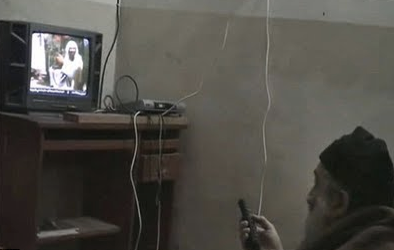Obama's persistent AfPak impasse
Updated 2:03 p.m. Eastern Time
A white-bearded Osama bin Laden sat in a barren room in his Abbottabad, Pakistan compound watching himself on a small TV. At the same time, the expanding fleet of U.S. armed drones were zeroing in on bin Laden's compatriots and taking them out of service with some precision.
Ultimately, bin Laden's demise came at the hands of Navy Seals, rather than a drone strike. His death served to demythologize the Al Qaeda leader and revealed the struggles within his ranks to keep the terrorist organization's flame alive.
According to President Obama, information gleaned from bin Laden's compound showed the terrorist leader and al Qaeda under "enormous strain."
Transcript of President Obama's speech on Afghan troop drawdown
"Bin Laden expressed concern that al Qaeda has been unable to effectively replace senior terrorists that have been killed, and that al Qaeda has failed in its effort to portray America as a nation at war with Islam - thereby draining more widespread support," Mr. Obama said Wednesday.
The successful termination of bin Laden and other Al Qaeda high-level operatives played a central role in the decision to withdraw 33,000 troops by end of next summer, Mr. Obama said. After all, the invasion of Afghanistan was in response to the Sept. 11 attacks.
But a senior administration official said Wednesday that Al Qaeda in Afghanistan has not been a threat in recent years.
"On the threat side, we haven't seen a terrorist threat emanating from Afghanistan for the past seven or eight years," the official said. "There has been clearly fighting and threats inside of Afghanistan, but the assessment of anywhere between 50, 75 or so al Qaeda types that are embedded in Haqqani units, basically, tactical fighting units inside of Afghanistan, they are focused inside Afghanistan with no indication at all that there is any effort within Afghanistan to use Afghanistan as a launching pad to carry out attacks outside of Afghan borders."
Mr Obama cautioned Wednesday that Al Qaeda "remains dangerous, and we must be vigilant against attacks. But we have put al Qaeda on a path to defeat, and we will not relent until the job is done."
When Mr. Obama talks about the dangers of Al Qaeda, Pakistan is an obvious focus -- it's where the majority of drone strikes against individual terrorist targets take place.
"The threat has come from Pakistan over the past half-dozen years or so, and longer. And what we've been able to do, particularly over the last year, but through the course of the last two and a half years of this administration, is to degrade al Qaeda's core capabilities significantly," a U.S. senior official said Wednesday.
However, U.S. officials are concerned that with a U.S. pullout from Afghanistan, a resurgent Al Qaeda could once again use the country as a base of operations. And without a U.S. base of operations in Afghanistan, keeping a close eye on Pakistan -- which has been effectively harboring terrorists and remains an uncertain partner in the war on terror -- becomes more difficult.
"...Pakistan's angry reaction to that raid [on bin Laden's compound] also makes it more urgent than ever that the United States maintain sites outside the country to launch drone and commando raids against the militant networks that remain in Pakistan, and to make sure that Pakistan's fast-growing nuclear arsenal never falls into the wrong hands," David Sanger wrote in the New York Times.
On Thursday, Afghan President Hamid Karzai said that his nation's youth will stand up and defend their country as the U.S. begins to pull troops out. Meanwhile, the Taliban promised to fight as long as foreign soldiers remain in the country. Tens of thousands of U.S. combat troops intend to remain there until 2014.
In his speech, Mr. Obama expressed a wish that the U.S. "build a partnership with the Afghan people that endures--one that ensures that we will be able to continue targeting terrorists and supporting a sovereign Afghan government." He hopes for the same with Pakistan. But the complicated situation means that the president will have his hands full in trying to keep the AfPak wheels from falling off even as he seeks to shift resources to nation building at home.
